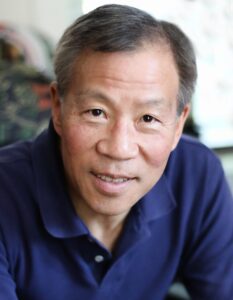Tuesday, March 29, 2022
#BookReview - Powers of Darkness by Bram Stoker
#AuthorInterview with Karla Jordan, author of Cartwheels in the Dark
Monday, March 28, 2022
#AuthorInterview with Richard Paik, author of A Thing or Two About the Game
Today, Feathered Quill reviewer Katie Specht is talking with Richard Paik, author of A Thing or Two About the Game.
FQ: Can you describe your inspiration for the story behind A Thing or Two About the Game? Is it based on any personal coaching experience?
PAIK: I’ve spent five seasons coaching youth softball. I decided to coach because my daughter played, and I had some ideas about what could help these girls. I was shocked to find how much I cared, and how much I enjoyed it.
I do not recall ever thinking, “I’m going to write a book about this.” But I started jotting thoughts about drills and girls’ reactions; some of these became small vignettes. It was fun writing these down, and I gradually realized that I might make a bigger project of it.
FQ: As this is your first published work, can you share a bit about your professional background?
PAIK: The simplest answer is that I made my living as a City Planning consultant. Mostly helping – trying to help – municipalities revitalize. There’s not much of a link between that and this book, but the exercise in planning, to oversimplify, is largely an exercise in picking battles; in recognizing what you can potentially accomplish, and what you can’t. Maybe that’s a reach, but if there’s any connection between my professional life and this book, that’s it.
I spent my earlier years doing a lot of career-hopping; it took a long time before I started getting serious about life. Then, in more recent years, I’ve started—and failed—with a few of my own businesses. As I type here, I realize that those experiences may relate to the book.
FQ: What was the writing experience like for you as you wrote this story?

PAIK: There are probably five different answers to this question. There were periods when new ideas and new solutions popped up every day. That was a blast. Other times when I realized how, gradually, the story had shifted. Those were great discoveries. There were very few dead spots where it felt like drudgery.
I should say that, about four or five years ago, I’d gotten started on new writing projects and I let go of this book. Pretty much forgot about it. Then, sometime In 2020, I decided to submit the manuscript (just because it was “done” – or at least lying around) to Atmosphere Press. They accepted it about a year ago, in March, 2021. I was scared. I was invested in the new pieces I’d been writing. But I decided to move forward with this again.
One other thing: The book started out as a bunch of small softball-coaching vignettes about coaching moments and discoveries. Many of those got cut. Which was painful.
FQ: How did you develop the main character of Brad?
PAIK: Parts of Brad started with me: his ideas for drills, for how he wanted to conduct himself as a coach. After that, the cliché about characters taking over turned out to be true. Brad’s character evolved in response to the circumstances and the characters that emerged around him, including not only his players, but his friends – especially Mark, his childhood friend and rival.
FQ: What is the most important thing you hope readers will take away with them after reading A Thing or Two About the Game?
PAIK: I’m happy to say that this is a very difficult question. I say that because at times, as I was writing, I was afraid that it was getting too “theme-driven,” at the expense of the details of a scene, or the quirks of a character; that I was trying too hard to make sure everybody “gets it.” Theme can get clunky, like a 100-pound backpack.
So, to answer the question, I think I want readers to have a sense of shared journey. I like to think that every character—every player, in particular—has their own issue; their own reason to be involved, and their own take-away – their own journey, which is shared with her teammates. I hope readers feel the same way, and that they enjoy talking about it, about their favorite characters and moments.
FQ: Are any of the characters, especially the girls on the team, modeled after people you personally know in your life?
PAIK: To a degree. There were specific moments—not necessarily “big” moments—that I wanted to write about, and some of those moments became part of a character’s story, and then led to other character traits.
FQ: When you began writing, did you have the entire story already developed in your mind, or did it come to you gradually as you wrote?
PAIK: The latter. Earlier in my life I’d had writing aspirations, but was always foiled by plot. I was terrible at coming up with plot lines. For this book, plot was made easier by two factors. The first factor was simply that it would be set within the course of a season. The season provided an armature: things had to happen in that time frame, and it provided at least a minor tension in the curiosity of how things would turn out, whether the team would win. The second factor was just that I had vignette ideas for player characters, and their responses to the coach and his ideas. So, I could let characters’ responses and actions come out, which helped steer the plot.
FQ: When you were a youth, did you play on any sports teams and were any of your experiences written into A Thing or Two About the Game?
PAIK: Played plenty of sports. Still do. But no, I can’t think of any experiences from those endeavors that I wrote about in this book.







